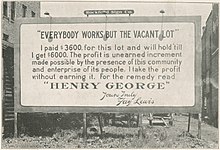Speculation (economics)
In economics, speculation, according to Nicholas Kaldor, consists of the purchase (or sale) of goods with a view to their subsequent resale (repurchase), when the reason for such action is the expectation of a change in the affected prices with respect to the dominant price and not the profit derived from their use, or from some type of transformation carried out on them or from the transfer between different markets.
A speculative operation seeks not to enjoy the good or service involved, but to obtain a benefit from the fluctuations in its price based on the theory of arbitration. In a broad sense, any form of investment involving a medium is speculative; however, the term is usually applied to that investment that does not entail any kind of commitment to the management of the assets in which it is invested, and is limited to the movement of capital (financial market), usually in the short or medium term.
Speculation is based on forecasting and preception, so that the speculator can also make a mistake if he does not correctly foresee the evolution of future prices, so that he will have to sell cheap something that he bought expensive. The speculative market therefore rewards those who know how to foresee.
Speculation is avoided in the religious moral field.
Effects on the real economy
Speculation encompasses commercial operations that are carried out with valuable merchandise, or goods, so that they are bought at a low price hoping to sell them at a higher price.
It can be affirmed that the greatest amount of speculation occurs in commerce, which generates jobs, which encourage the increase in real wages, which in turn stimulates the consumption of products, which in turn causes the economy generates more jobs and consequently less poverty. Speculation is harmful especially when there are monopolies. In an economy with many competitors and an economy open to imports, the market will push for each product or service to be sold at the lowest possible price, avoiding overpricing thanks to the fact that there are many suppliers of these products or services.
When there are markets that are closed to imports or monopolies or both, and the economic good or service is very necessary or inelastic, the producer or supplier will obtain higher profit margins, because they will be able to speculate practically without limit, due to having no competition.
Criticism
In some cases, price increases due to the massive purchase of a good or service in turn cause greater demand for speculative purposes: more people will buy the product hoping to sell it in a short time and earn money. If the prospects for asset price increases are calculated upwards, and if these movements are usually encouraged by soft credit policies based on low interest rates, the depletion of the available liquid could cause an economic bubble. A sustained period of speculative buying is often accompanied by a period of selling in which prices fall dramatically. In many cases, speculation is associated with the use of privileged information, which is classified as a crime in most countries.
Some market players use monopoly to push prices up or down according to their own interests, sometimes leaving little room for legality.
In the case of speculation through financial markets, this is caused by government decisions such as the issuance of inorganic money due to excess spending (which causes the market to be saturated with money and inflation) or the setting of rates very low interest rates by central banks, to stimulate investment with low-cost credits, which stimulates the delivery of high-risk credits.
In countries with currency controls or import regulations, the market will be left with few suppliers, and thus monopolists will be created who will take advantage of the circumstances and increase their prices to obtain greater profits.
According to liberal theory, the only way to avoid wild speculation is through competition; the more bidders, the lower prices. Price controls create shortages and closure of producing companies, and therefore the market is monopolized even more, and speculation is stimulated.
Another negative aspect of speculation has to do with the creation of holdouts or vulture funds that can paralyze even the actions of national states, for example Argentina. States that systematically spend more than of their real possibilities they are financially very vulnerable, they regularly fail to meet their commitments and end up being easy victims of speculative funds. In these cases, the responsibility is at least shared between the debt holder and his speculative executor.
Contenido relacionado
Economy of iraq
General Bravo
Economy of italy
